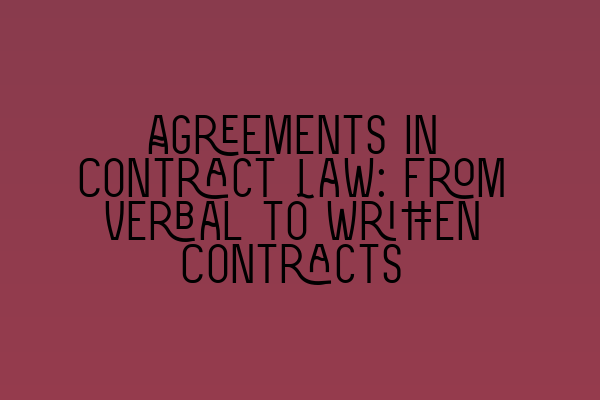Agreements in Contract Law: From Verbal to Written Contracts
Contracts are the foundation of any legal relationship. They establish the obligations and rights of the parties involved and provide a framework for resolving disputes. In contract law, agreements can take different forms, ranging from verbal agreements to written contracts. In this article, we will explore the different types of agreements in contract law and their implications for both parties.
Before we dive into the specifics, it’s important to mention that verbal agreements can be legally binding in certain circumstances. However, they often lack the clarity and enforceability of written contracts. Let’s examine the various types of agreements in contract law:
1. Verbal Agreements
Verbal agreements, also known as oral contracts, are agreements that are made through spoken words rather than written documents. While they can be legally binding, proving the terms and conditions of a verbal agreement can be challenging. The absence of a written record often leads to misunderstandings and conflicting interpretations.
Despite their limitations, verbal agreements can still hold legal weight in certain situations where there is evidence of the agreement, such as witness testimony or a series of actions that prove the parties intended to enter into a contract. It’s crucial to consult a contract law expert to assess the enforceability of a verbal agreement in your specific case.
2. Written Contracts
When it comes to contractual agreements, written contracts are generally considered the gold standard. They provide a clear record of the terms and conditions agreed upon by the parties involved. A written contract ensures that all parties are on the same page, reducing the risk of misunderstandings and disputes.
A well-drafted written contract includes essential elements such as the names and contact details of the parties, the specific terms and conditions of the agreement, the duration of the contract, and provisions for dispute resolution. It is essential to seek legal advice when drafting or entering into a written contract to ensure that all necessary provisions are included and that your interests are protected.
For further insights on the impact of frustration on contractual obligations, you may find our article on Exploring the Impact of Frustration on Contractual Obligations: Legal Insights helpful.
3. Electronic Agreements
The digital age has brought about the emergence of electronic agreements. These agreements are formed and executed electronically through digital platforms and means, such as emails, online forms, electronic signatures, and click-wrap agreements. Electronic agreements can be just as legally binding as traditional written contracts, as long as the essential elements of a contract are present.
Electronic agreements offer the convenience of instant communication and contract formation, but it is crucial to ensure that you understand the terms and conditions before agreeing electronically. Reading, understanding, and reviewing an electronic agreement before providing consent is just as important as with traditional written contracts.
If you want to learn more about interpreting contractual clauses, our article on Interpreting Contractual Clauses: Unlocking the Hidden Meanings delves deeper into this topic.
Implications of Agreements in Contract Law
The type of agreement chosen can have significant implications for the parties involved. Verbal agreements may suffer from the lack of written evidence, making it difficult to enforce or prove the agreed-upon terms. On the other hand, written contracts provide a clear record of the agreement, reducing the likelihood of disputes and misunderstandings.
Both verbal and written agreements should be considered binding and treated with care. However, it’s worth noting that written contracts offer stronger legal protection. A written contract can specify the rights and obligations of each party, provide remedies in case of a breach, and establish the jurisdiction for dispute resolution.
If you’re an entrepreneur navigating the legal aspects of business contracts, our article on Legal Aspects of Business Contracts: Key Considerations for Entrepreneurs offers valuable insights.
In conclusion,
While verbal agreements can hold legal weight in certain circumstances, it is generally advisable to opt for written contracts to ensure clarity, enforceability, and protection of your rights. Electronic agreements offer a modern and convenient alternative, but careful consideration of the terms is essential.
For a detailed comparative analysis between SQE Contract Law and traditional qualifications, make sure to check out our article on SQE Contract Law vs. Traditional Qualifications: A Comparative Analysis.
If you want to gain a deeper understanding of the various types of agreements in contract law, our article on Agreements in Contract Law: Understanding Its Various Types can provide you with valuable insights.
Remember, when entering into any agreement, be it verbal, written, or electronic, consulting a contract law expert is vital to ensure that your rights and interests are protected.
